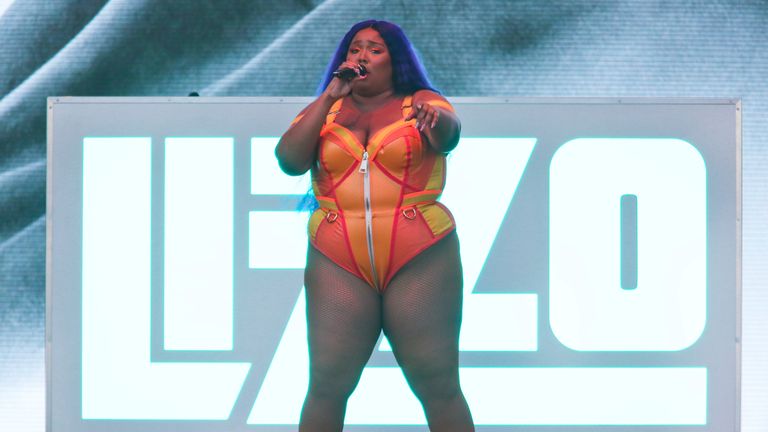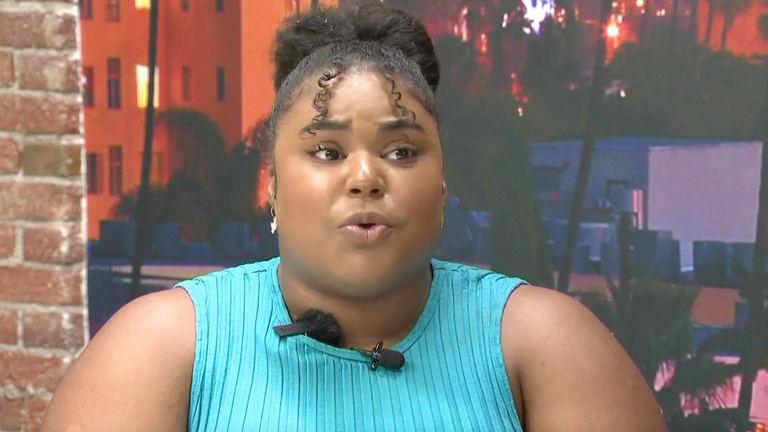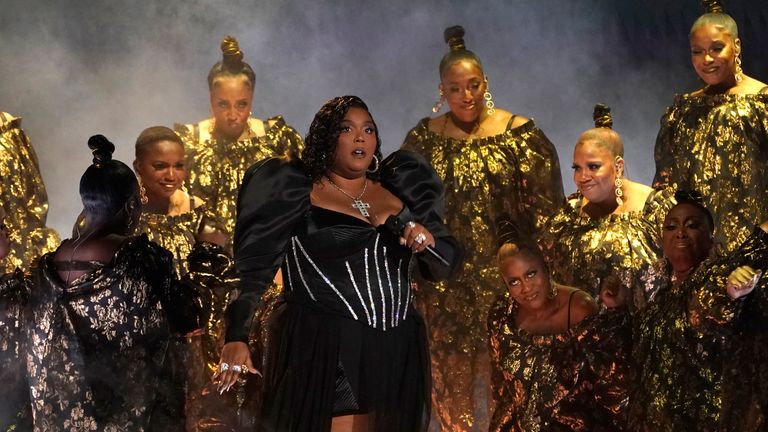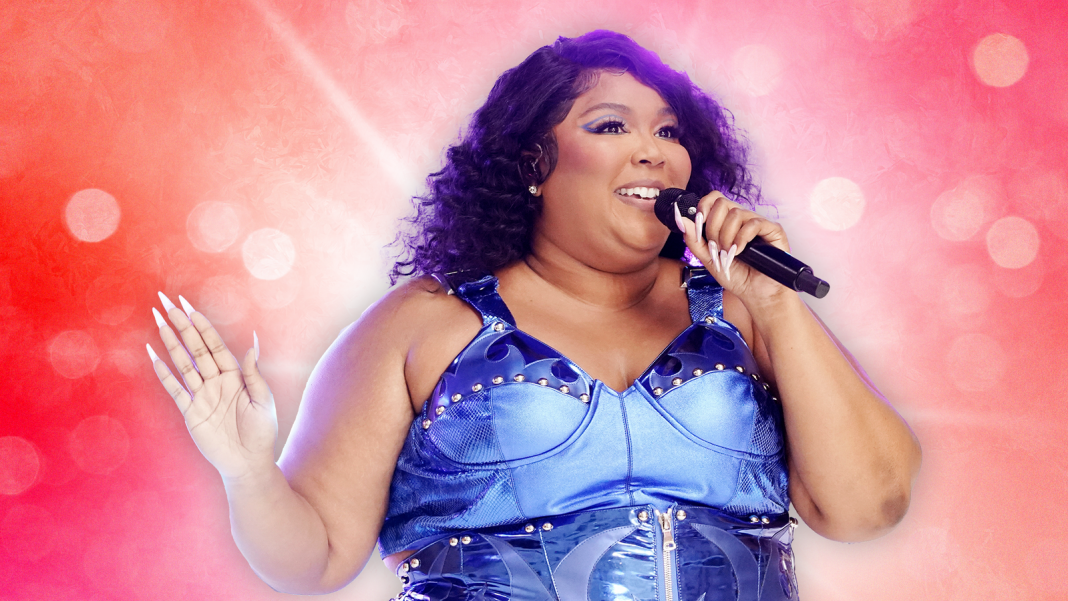Body positivity is Lizzo’s brand.
No stranger to the subject of fat shaming, the singer – whose real name is real name Melissa Viviane Jefferson – has been credited with changing the narrative around plus-size women, calling out sizeist behaviour and refusing to conform to industry stereotypes as she cranks out the hits in a rainbow array of skin-tight leotards and bodysuits.
She’s won four Grammys, and in 2019 was named Time’s entertainer of the year. Her 2023 Glastonbury set on the festival’s main stage was met with critical acclaim. And she’s been credited with single-handedly raising the profile of woodwind, making it officially cool to play the flute.
Pic: AP
But now, with claims she is guilty of weight shaming and sexual harassment – accusations the 35-year-old singer, songwriter, rapper and flautist strongly denies – her future is hanging in the balance.
Three of Lizzo’s former dancers have filed a civil lawsuit against her and her production company Big Grrrl Big Touring Inc (BGBT) – including accusations she pressured one to touch a nude performer at an Amsterdam strip club, and made comments about one performer putting on weight before firing her.
Two of the dancers had won their roles on Lizzo’s Emmy-winning reality show Watch Out For The Big Grrrls, which offers plus-sized dancers the chance to compete to be part of her team.
Two days after the lawsuit was publicly announced, Lizzo posted a statement on Instagram, calling the allegations against her false – and labelling them “unbelievable,” “outrageous,” and “sensationalised”.
She said she was passionate about her art, and that “with passion comes hard work and high standards,” adding “sometimes I have to make hard decisions”.
In turn, Lizzo accused “people and the media” of portraying her as a “villain”.
She then touched on the very reason there’s been such a showbiz stir over the claims, telling her fans: “I know what it feels like to be body shamed on a daily basis and would absolutely never criticise or terminate an employee because of their weight.”
For a long time in the shiny and glamourous world of showbiz, thinness and fame have been so firmly intertwined as to be virtually inseparable. Lizzo exploded that myth – bursting onto the scene and refusing to be told she needed to be a size zero in order to make it.
The accusations against her must sting particularly hard due to the fact she’s previously spoken so openly about her struggles with body issues from an early age and experiencing body shaming herself due to her weight.
Advocating body confidence, and a role model to many, she gave a long overdue boost to the visibility of plus-sized women in entertainment.

Pic: AP
But when Beyonce skipped a reference to Lizzo in a live performance of Break My Soul (The Queens Remix) on Tuesday night, many saw it as an early snub, signalling the star’s potential cancellation.
And Lizzo’s product is more than just herself or her music – there’s also the bandwagon of merchandise that comes with any bona fide US star. You can buy Lizzo T-shirts, trackies and hoodies – and even a Lizzo thong with Juice (the title of her 2019 hit) plastered across the front.
It seems likely that sales of the merch may now slow – at least until the lawsuit is concluded – as fans try to work out if hers is a label they want to be associated with.
Further accusations against Lizzo have followed news of the lawsuit, with Oscar-nominated filmmaker Sophia Nahli Allison posting statements on social media, supporting the claims of the three backing dancers, and calling Lizzo “arrogant, self-centred, and unkind”.
Please use Chrome browser for a more accessible video player

0:29
Lizzo dancer: ‘I was terrified for my job’
Nahli Allison had been due to direct a documentary about the star, travelling with her in 2019, but said she dropped out of the project after two weeks after being treated with “such disrespect by her”.
She accused Lizzo of creating “an extremely toxic and hostile working environment” – calling her “a narcissistic bully,” claiming the singer has “built her brand off lies”, and saying “her image and ‘message’ was a curated facade”.
Following Lizzo’s response to the accusations, the law firm representing the three former dancers says the singer has “failed her own brand and let down her fans” – adding that her words were an attempt to “minimise the trauma” she’s alleged to have caused. They also say more people have been in touch with them since the women came forward.
It’s not the first time Lizzo – who as a songwriter makes her living from words – has been in the firing line over perceived insensitivity to others.

Pic: James McCauley/Shutterstock
Last year, a lyric from her song Grrrls generated controversy after using a derogatory term for the condition spastic cerebral palsy.
The lyric was eventually changed, with Lizzo saying at the time: “As a fat black woman in America, I’ve had many hurtful words used against me so I understand the power words can have (whether intentionally or in my case, unintentionally).”
The singer now finds herself on the defensive again – with many who previously felt empowered and emboldened by her body positive messages now likely to be questioning the value of words and actions some claim are counterfeit and empty.

Lizzo performs with her dancers at the 65th annual Grammys
With her reality show commissioned for a second season, there will now also be eyes on the reaction of Amazon Studios (who produce the show along with the singer’s production company Lizzo Bangers). They have previously hailed the singer as “one of the most exciting, creative, joyful artists in the industry”.
When launching auditions in April, Lizzo herself said: “I’ve witnessed lives change through this show and I’m grateful for the opportunity to continue making space for even more Big Grrrls around the world to shine and break down barriers across this industry.”
This content is provided by Spreaker, which may be using cookies and other technologies.
To show you this content, we need your permission to use cookies.
You can use the buttons below to amend your preferences to enable Spreaker cookies or to allow those cookies just once.
You can change your settings at any time via the Privacy Options.
Unfortunately we have been unable to verify if you have consented to Spreaker cookies.
To view this content you can use the button below to allow Spreaker cookies for this session only.
Click to subscribe to Backstage wherever you get your podcasts
Known for leading chants of “I love you, you are beautiful and you can do anything” during her gigs, the authenticity needed to make those kind of affirmations feel inspiring rather than icky is now under scrutiny.
Lizzo now risks seeing her triple-charged brand – with all the colour, vibrancy and pizzazz associated with her work – turn from positive to negative in the blink of an eye.
She plays a superhero in her latest glossy music video, but in reality, Lizzo’s superpower – her all-embracing body positivity – could turn out to be her kryptonite if it’s proved she didn’t live by the standards she set for others. The forthcoming lawsuit will decide if she’s cast as the hero or “villain” of that story.
Sky News has contacted Lizzo for comment.







